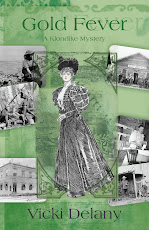
Today, I'm very pleased to have my good friend (and wonderful crime writer) Rick Blechta guest at One Woman Crime Wave. Please welcome Rick
Writing is obviously something that’s very difficult to do to a schedule. When the muse speaks, you’d better be listening and have your pen (virtual or not) in your hand. Trouble is most of us have day jobs, have other important things to do with our lives, and our writing time comes very dearly bought. So when you do have time to sit down and exercise that writing muscle in your head, you want to make the most of that time. Here are a few hard-earned tips to help.
1. Tell people that when the door to your “writing room” is shut, you do not want to be disturbed – unless the world is coming to an end or the Publisher’s Clearing House people are at your door with that million dollar cheque. It’s easy for others to think, Oh, he’s just writing. I only need to disturb him for a moment to ask what he wants for dinner. Even a small interruption can completely destroy a writer’s train of thought. If those around you don’t get the message easily, put a sign on your door saying, “Do NOT disturb!!! I will be done working at [insert time here] and will speak to you then”. Ever wonder why so many successful writers have little shacks at the bottom of their gardens or cabins in the woods where they disappear to? Keep writing.
2. Don’t answer the phone. Same reason as #1. If it’s important, they’ll either leave a message or call back. Keep writing.
3. Whatever you do, don’t check your email, don’t even have your browser turned on. If you’re like me, you don’t have several computers, but I do know writers who have bought a cheap second one that they use for writing. It’s not connected to the Internet and it’s strictly used for writing. It is tempting when writing to check a quick fact by browsing the Internet for the info. Unless you’re made of really strong stuff, I guarantee you won’t look up just your quick fact, you’ll check a sports score or glance at your Facebook page to see if someone has poked you (what is poking anyway?). Let’s face it, you can always look things up later, be it how to spell a word or the reasons why World War One took so long to end. You’re writing, right? Research can be done anytime. Keep writing.
4. Don’t go back to fix what you’ve just written. You may know that last sentence was a complete dog, but it’s the information you want to get down, the flow you want to develop and maintain. When you’re on a roll, just keep going. I try to not even correct mistyped words or add missing punctuation. If you noticed it now, you’ll notice it later, and it can be fixed then. Keep writing.

5. Write to the bitter end. You probably know from the start of your session, how much time you have to work. Even if you reach the end of a chapter close to the end of your session, keep writing until you’ve reached your time limit. Quite often it will help your next day’s work because it will be clearer where you wanted to go next. In short, writing requires discipline. There are a lot of unsuccessful writers out there who never grasped that point. They might even be very talented, but you know what they say about talent. It’s easy to just waste valuable time, make up excuses to yourself,let other people get in your way, but the writers who complete novels are the ones who sit down and do it.
Rick Blechta is the author of seven crime novels, the most recent of which is Orchestrated Murder, part of Orca Book Publishers Rapid Reads line. This novella is aimed at those with poor reading skills, but it’s also a compelling quick read for anyone. Next fall, Dundurn Press will be publishing The Fallen One, a full-length novel about an opera singer who just might be seeing dead people. His novel, Cemetery of the Nameless, was a finalist for the Arthur Ellis Best Novel award in 2005.For more information, visit his website: www.rickblechta.com













Rick, you beat me to it! Finding time to write is the topic of From the Editor in Crime Time this month (at layout now). And - as always - you give sage advice that leaves me with something new to try.
ReplyDeleteHi Rick, thanks for the valuable reminders.
ReplyDeleteUna and Mel, my pleasure. Glad you got something out of it all!
ReplyDeleteGreat share thanks for posting
ReplyDelete